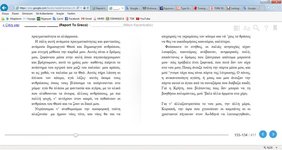You are using an out of date browser. It may not display this or other websites correctly.
You should upgrade or use an alternative browser.
You should upgrade or use an alternative browser.
με φαντασία και αγέρα
- Thread starter altan
- Start date
Good morning, Altan
No other meanings, «αγέρας» is "air or wind". However, one could argue that we have a simile here, referring to the creation fables of God creating human by breathing into a mass of clay.
No other meanings, «αγέρας» is "air or wind". However, one could argue that we have a simile here, referring to the creation fables of God creating human by breathing into a mass of clay.
Theseus
¥
Good morning, Altan. I would attempt to translate the excerpt you are referring to (& put myself in the firing line, to boot) as follows. The translation has no literary merits:-
'He made men as we see them, crawling on the soil: but I will fashion, with imagination & air, the stuff that dreams are made on (echoes of The Tempest!)) other men with more soul, able to withstand time itself: God's men would die & mine would live!'
'He made men as we see them, crawling on the soil: but I will fashion, with imagination & air, the stuff that dreams are made on (echoes of The Tempest!)) other men with more soul, able to withstand time itself: God's men would die & mine would live!'
Good morning, Altan
No other meanings, «αγέρας» is "air or wind". However, one could argue that we have a simile here, referring to the creation fables of God creating human by breathing into a mass of clay.
Here's that "one", I for one.
Not arguing, of course; just thinking that's the deeper meaning implied here, beyond the literal "out of thin air" which is certainly valid, but at the same time conveying the breath of air that, according to Christian tradition, God breathed (εμφύσησε) into the nostrils of that clay man, the breath of life to make him a living human being, that πνοή ζωής.
And to take it a step further, the spirit (πνεύμα) inhabiting that clay from then on, since Kazantzakis in this passage discusses spiritual life and his own fight in that field, writing about "the stuff that dreams are made of" that Theseus mentions and "with more soul" (ψυχή και σώμα, αγέρας και χώμα) right after that "με φαντασία και αγέρα".
Perhaps I'm going a step too far, but I believe that those connotations would not have escaped Kazantzakis when he wrote this; they would be more than a puff of air gone with the wind in his mind. I would not burden the translation with all that, though. Αυτό που αδιόρατα ο συγγραφέας ίσως να υπονοεί, ο αναγνώστης πρέπει να το ψυχανεμιστεί· και η δουλειά του μεταφραστή είναι να αποδώσει μιαν εσάνς, μια πνοή, το πνεύμα (φύσημα originally, esprit and spirit later) του κειμένου, όχι να σηκώσει αγέρα.
altan
Member
Here's that "one", I for one.
Not arguing, of course; just thinking that's the deeper meaning implied here, beyond the literal "out of thin air" which is certainly valid, but at the same time conveying the breath of air that, according to Christian tradition, God breathed (εμφύσησε) into the nostrils of that clay man, the breath of life to make him a living human being, that πνοή ζωής.
And to take it a step further, the spirit (πνεύμα) inhabiting that clay from then on, since Kazantzakis in this passage discusses spiritual life and his own fight in that field, writing about "the stuff that dreams are made of" that Theseus mentions and "with more soul" (ψυχή και σώμα, αγέρας και χώμα) right after that "με φαντασία και αγέρα".
Perhaps I'm going a step too far, but I believe that those connotations would not have escaped Kazantzakis when he wrote this; they would be more than a puff of air gone with the wind in his mind. I would not burden the translation with all that, though. Αυτό που αδιόρατα ο συγγραφέας ίσως να υπονοεί, ο αναγνώστης πρέπει να το ψυχανεμιστεί· και η δουλειά του μεταφραστή είναι να αποδώσει μιαν εσάνς, μια πνοή, το πνεύμα (φύσημα originally, esprit and spirit later) του κειμένου, όχι να σηκώσει αγέρα.
Thanks a lot of daeman. Your opinions are very reasonable.

